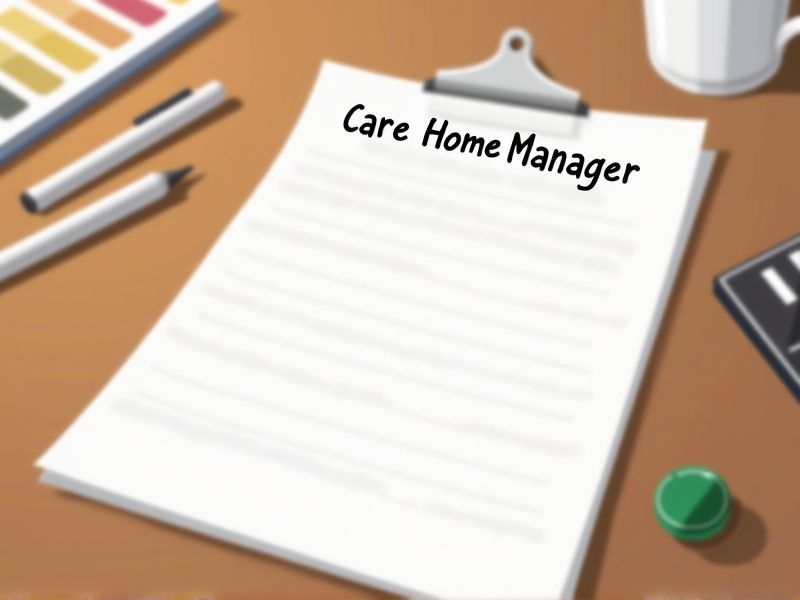
A Care Home Manager must navigate complex regulations and ensure high-quality care, making certain certifications essential. These credentials enhance managerial skills and promote a safer, ethical environment for both residents and staff. Certification ensures compliance with industry standards, increasing trust among clients and stakeholders. Key certifications are necessary for success as a Care Home Manager.
National Care Certificate
The National Care Certificate is essential for a Care Home Manager because it ensures they have standardized knowledge and skills foundational for high-quality care. This certification helps improve consistency in caregiving practices, reducing variability in care standards. It also supports the development of a shared language and understanding among care workers, enhancing teamwork and communication. As a result, the overall quality of resident care improves, fostering a safer and more efficient care environment.
NVQ Level 5 in Leadership for Health and Social Care Management
An NVQ Level 5 in Leadership for Health and Social Care Management equips Care Home Managers with advanced skills in strategic planning and leadership. This qualification ensures managers understand regulatory frameworks and maintain compliance with health and safety standards. It enhances decision-making and problem-solving abilities, crucial for daily operational effectiveness. The training helps improve staff management, promoting a better quality of care for residents.
Diploma in Leadership for Health and Social Care
A Diploma in Leadership for Health and Social Care equips Care Home Managers with essential skills to lead effectively and improve care standards. This qualification enhances understanding of regulatory compliance, impacting overall facility operations positively. Managers with this diploma are better positioned to implement person-centered care strategies, which significantly enhance resident quality of life. Professional development through such specialized education often correlates with improved staff morale and retention rates.
Health and Social Care Management Certification
Certified training in Health and Social Care Management helps develop essential leadership skills for care home managers, affecting improved team coordination and resource management. Understanding regulatory compliance and ethical standards through certification ensures that care homes operate within legal frameworks, promoting safe and ethical practices. Advanced knowledge in health care management enhances decision-making capabilities, directly impacting the quality of care provided. Certification often serves as a benchmark for professional competence, influencing trust and credibility among service users and stakeholders.
Food Safety and Hygiene Certification
Care home managers oversee vulnerable populations, making food safety and hygiene certification crucial to prevent contamination that could jeopardize residents' health. Regulatory authorities often require these certifications to ensure compliance with health standards, reducing the risk of legal issues. Certification provides managers with knowledge of best practices, minimizing the chance of foodborne illness outbreaks. Consistent application of certified practices can enhance care home reputation, attracting more families to trust the facility with their loved ones.
Manual Handling Training Certification
Manual Handling Training Certification is needed for a care home manager to reduce the risk of injury to both staff and residents. Incorporating safe handling practices ensures compliance with health and safety regulations, which can prevent legal repercussions for the care home. Proper training enhances the efficiency of staff by teaching methods to move residents safely, improving overall care quality. This certification promotes a culture of safety and responsibility within the care home environment.
Dementia Awareness Certification
Care home managers equipped with a Dementia Awareness Certification are better prepared to understand and address the complex needs of residents experiencing cognitive decline. The certification ensures that managers can implement effective communication strategies, reducing the likelihood of misunderstandings and improving overall care quality. Recognizing early signs of dementia in residents leads to timely interventions, potentially enhancing their quality of life. This certification can improve staff training programs, fostering a care environment that is both compassionate and informed.
Safeguarding Adults Certification
Care home managers need Safeguarding Adults Certification because it equips them with the knowledge to identify potential abuse or neglect in vulnerable populations. This certification ensures managers adhere to legal standards, promoting a safe environment for residents. Proper training in safeguarding enhances the ability to implement effective protective measures and protocols. Certification reduces the risk of legal repercussions and improves overall trust in the care facility.
First Aid at Work Certification
The need for First Aid at Work Certification for a Care Home Manager stems from the responsibility to ensure the safety and wellbeing of both residents and staff in case of medical emergencies. This certification equips managers with the necessary skills to respond effectively, potentially reducing the severity of injuries or illnesses and preventing fatalities. Regulatory bodies often require such certifications to ensure compliance with health and safety standards in care home environments, minimizing legal and operational risks. Moreover, demonstrating proficiency in first aid fosters trust among residents' families and enhances the overall quality of care provided by the facility.
Medication Management Certification
Medication Management Certification is essential for a Care Home Manager because it ensures compliance with healthcare regulations, which can prevent legal issues and penalties. Proper certification equips managers with knowledge to oversee accurate medication administration, reducing risks of errors that may harm residents. Certified managers can train and supervise staff effectively, leading to enhanced resident safety and care quality. Certification builds trust with families and healthcare partners, strengthening the care home's reputation and credibility.
Summary
When you, as a Care Home Manager, obtain certifications, it often enhances your credibility and professional standing. This can lead to improved operational standards and elevate the overall quality of care provided to residents. Enhanced credentials may open up new opportunities for career advancement and expand your network within the healthcare industry. The facility's reputation and trust with families and stakeholders typically improve, resulting in increased demand and occupancy.
